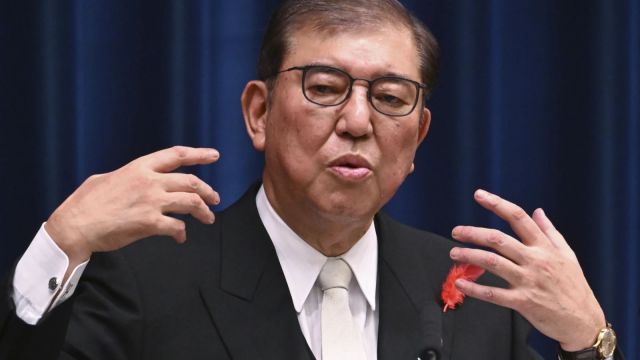

New DelhiNov 14, 2024 17:34 IST First published on: Nov 14, 2024 at 19:33 IST
Japan is grappling with weak government leadership. PM Shigeru Ishiba’s rise has been marred by internal struggles within his Liberal Democratic party (LDP) and a lack of political momentum.
For the first time in three decades, the country faces a minority government. The ruling coalition of the LDP and Komeito failed to secure a majority in the House of Representatives elections on October 27. The LDP lost 68 seats, and Komeito lost eight, while the opposition Constitutional Democratic Party (CDP) increased its strength to 148 seats. The surprise package of the election was the Democratic Party for the People (DPFP) which surged from seven to 28 seats. Despite gains, the opposition parties were unable to form a cohesive alliance to challenge Ishiba. This fragmentation, combined with ideological differences, prevented the opposition from unseating him.
Perceived as a reform candidate for the LDP, Ishiba’s rise was complicated by the scandal-ridden environment within the LDP. He took a gamble by dissolving parliament and hoped for a majority that would consolidate both the party and the government under him. The outcome did not align with expectations; the public punished the LDP. Interestingly, despite Ishiba’s relative lack of success in the elections, opinion polls showed support for his leadership. The Japanese people may indeed see him as an agent for reform.
Ishiba now faces significant challenges in leading a minority government. He is set to join the Asia-Pacific Economic Cooperation (APEC) and G20 summits, but his domestic political situation requires urgent attention. A minority government in Japan is a rare scenario, and Ishiba will need to work closely with opposition parties to maintain stability. While the government is not currently at risk of a no-confidence motion due to the lack of a clear alternative, there is a strong possibility of programmatic engagements with various opposition parties pushing their own agendas.
Foreign policy and defence are likely to remain key areas of consensus between the ruling coalition and the opposition. Japan’s defence budget, which is approaching 2 per cent of GDP, is a long-term commitment, but Ishiba will need to negotiate the 2025 budget carefully to ensure Japan’s defence posture remains robust. While there is no debate over defence spending, the economic situation, marked by a weakened Japanese Yen and sluggish economic growth, poses a more significant challenge.
One of the most pressing issues for Ishiba’s government will be political reform. The DPFP, which has won over parts of the electorate, advocates raising the tax-free income threshold to above $7,000, a measure designed to benefit the middle class. Though the increase is modest, it could result in a reduction of government revenues by approximately ¥7 trillion. Both the DPFP and CDP are also keen to address irregular political funding. These parties are pushing for more stringent scrutiny of political funding through an independent body, a move that could challenge the LDP’s long-established practices.
Ishiba, who campaigned on a platform of political reform, has reached out to opposition parties to address these issues. If he can pass laws regulating political funding and gain the support of the opposition, it could help ease the passage of the budget. How he manages this process will determine his success in navigating the complexities of a minority government, which now faces more competing parties than before.
most read
Japan’s position in the Indo-Pacific, where China, Russia, and North Korea are asserting stronger military postures, is of critical concern. Its leadership, now perceived as less stable following the resignation of Abe and the shorter tenures of Yoshihide Suga and Fumio Kishida, risks diminishing its standing as a strong partner in regional security. The absence of strong, consistent leadership may make it more susceptible to pressures from the US, especially on defence contributions and the costs associated with the US military presence in Japan.
Political instability in Japan, coupled with the rise of competing regional powers, leaves the country in a vulnerable position. Ishiba’s ability to navigate the complexities of domestic politics, secure a budget, and strengthen its defence posture will be crucial to ensuring Japan’s continued role as a stable and influential actor in the Indo-Pacific. If he fails to address these challenges, Japan may risk appearing weak in the face of growing regional tensions, especially as the US continues to demand greater defence contributions from its allies.
The writer is former Indian ambassador to Germany, Indonesia, Ethiopia, ASEAN and the African Union


